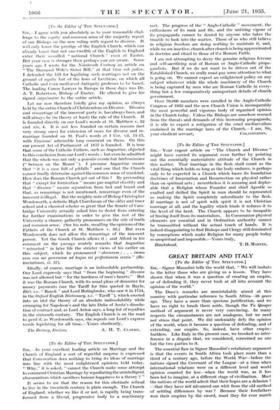[To the Editor of TILE SPECTATOR.] agree with you absolutely
as to your reasonable chal- lenge to the equity and common sense of the majority report of our Bishops on the new ruling with regard to divorce. It will only lower the prestige of the English Church, which can already boast that not one-twelfth of the English in England enter their so-called " national Church even at Easter. But your case is stronger than perhaps you are aware. Some years ago I wrote for the Nineteenth Century an article on " The Deceased Wife's Sister Bill,' at that time sub judice. I defended the bill for legalizing such marriages not on the ground of equity but of the laws of Leviticus, on which all Catholic and even mediaeval Antiquity professes to be based. The leading Canon Lawyer in Europe in those days was Dr. A. T. Robertson, Bishop of Exeter. He offered to give his signed imprimatur to the entire article.
Let me now therefore briefly give my opinion, as always held by the entire Church of Christendom on Divorce. Divorce and remarriage of the innocent party is, has always been, and will always be (in theory at least) the rule of the Church. It is founded directly on our Lord's words at St. Matthew v, 32 and xix, 4. It is not less founded on certain reasons (not very strong ones) for extension of cases for divorce and re- marriage founded on St. Paul's words at 1 Cor. vii, 11-15, with Erasmus' admirable long comment on them. On this our present Act of Parliament of 1857 is founded. It is true that some of the Catholic Fathers, such as Augustine, objected to this conclusion from our Lord's words ; but even he admitted that the whole was not only a quaestio rexata but latebrosissima (" Sermon on the Mount ”). I presume Augustine means that " it is a case full of pitfalls " and one that the Church cannot finally determine against the common sense of mankind. How does the Roman Church get out of this ? By pretending that except for fornication " means pre-nuptial chastity and that " divorce " means separation from bed and board and that, as remarriage is not mentioned, remarriage even of the innocent is illegal. But the weighty note of Bishop Christopher Wordsworth, a definite High Churchman of the older and truer school and a classical scholar so great that the Senate of Cam- bridge University actually asked him to desist from entering for further examinations in order to give the rest of the University a chance, gallantly pronounces on the side of truth and common sense. (See his note, recalling the opinions of the Fathers of the Church at St. Matthew v, 32.) But even Wordsworth does not allow the remarriage of the innocent person. Yet the Greek Church allows it ; and Alford in his comment on the passage acutely remarks that Augustine " retracted in later life the stricter views of his earlier on this subject, which he pronounced obscurum ; . . . imrno vero non me pervenisse ad hujus rei perfectionem sentio" (Re- tractationes, ii. 57).
Ideally, of course, marriage is an indissoluble partnership. Our Lord expressly says that " from the beginning " divorce was not allowed but " for the hardness of men's hearts." But it was the Roman Church, with its usual pleas of demurrer for money payments (see the Tariff for Sins quoted in Boyle, Diet. s.v. " Banck" and Lord Bolingbroke, who saw it in 1754, in the Oxford English Dictionary, s.v. Tariff "), which erected into an idol the theory of an absolute indissolubility while arranging for Napoleon's and the late Duke of Aosta's dissolu- tion of contract and, as Lord Acton says, a long list of royalties in the sixteenth century. The English Church is on the road to peril if, as Wordsworth says, she repeals our Lord's express words legislating for all time.—Yours obediently,








































 Previous page
Previous page